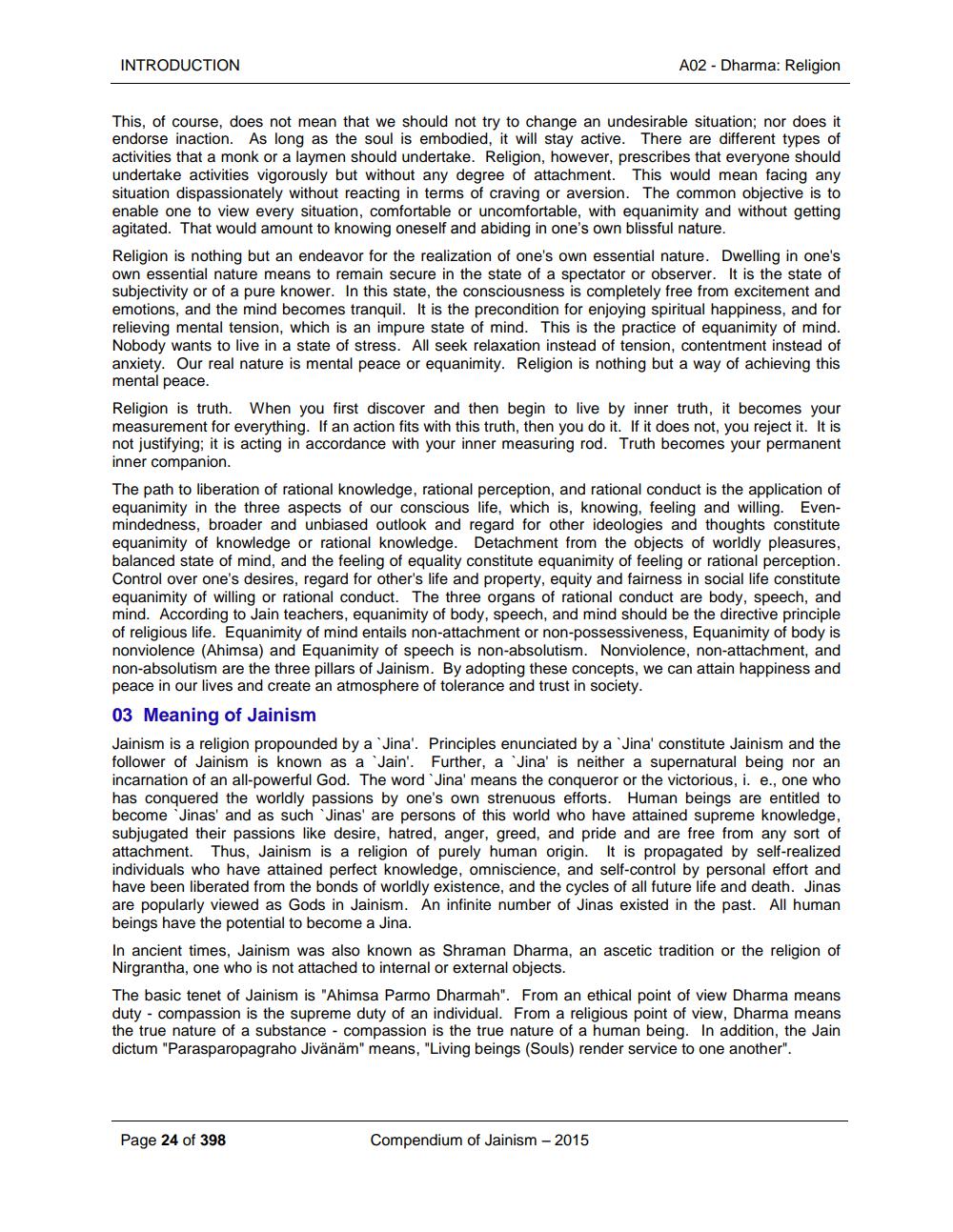________________
INTRODUCTION
A02 - Dharma: Religion
This, of course, does not mean that we should not try to change an undesirable situation; nor does it endorse inaction. As long as the soul is embodied, it will stay active. There are different types of activities that a monk or a laymen should undertake. Religion, however, prescribes that everyone should undertake activities vigorously but without any degree of attachment. This would mean facing any situation dispassionately without reacting in terms of craving or aversion. The common objective is to enable one to view every situation, comfortable or uncomfortable, with equanimity and without getting agitated. That would amount to knowing oneself and abiding in one's own blissful nature. Religion is nothing but an endeavor for the realization of one's own essential nature. Dwelling in one's own essential nature means to remain secure in the state of a spectator or observer. It is the state of subjectivity or of a pure knower. In this state, the consciousness is completely free from excitement and emotions, and the mind becomes tranquil. It is the precondition for enjoying spiritual happiness, and for relieving mental tension, which is an impure state of mind. This is the practice of equanimity of mind. Nobody wants to live in a state of stress. All seek relaxation instead of tension, contentment instead of anxiety. Our real nature is mental peace or equanimity. Religion is nothing but a way of achieving this mental peace. Religion is truth. When you first discover and then begin to live by inner truth, it becomes your measurement for everything. If an action fits with this truth, then you do it. If it does not, you reject it. It is not justifying; it is acting in accordance with your inner measuring rod. Truth becomes your permanent inner companion. The path to liberation of rational knowledge, rational perception, and rational conduct is the application of equanimity in the three aspects of our conscious life, which is, knowing, feeling and willing. Evenmindedness, broader and unbiased outlook and regard for other ideologies and thoughts constitute equanimity of knowledge or rational knowledge. Detachment from the objects of worldly pleasures, balanced state of mind, and the feeling of equality constitute equanimity of feeling or rational perception. Control over one's desires, regard for other's life and property, equity and fairness in social life constitute equanimity of willing or rational conduct. The three organs of rational conduct are body, speech, and mind. According to Jain teachers, equanimity of body, speech, and mind should be the directive principle of religious life. Equanimity of mind entails non-attachment or non-possessiveness, Equanimity of body is nonviolence (Ahimsa) and Equanimity of speech is non-absolutism. Nonviolence, non-attachment, and non-absolutism are the three pillars of Jainism. By adopting these concepts, we can attain happiness and peace in our lives and create an atmosphere of tolerance and trust in society. 03 Meaning of Jainism Jainism is a religion propounded by a Jina'. Principles enunciated by a Jina' constitute Jainism and the follower of Jainism is known as a Jain'. Further, a Jina' is neither a supernatural being nor an incarnation of an all-powerful God. The word Jina' means the conqueror or the victorious, i. e., one who has conquered the worldly passions by one's own strenuous efforts. Human beings are entitled to become Jinas' and as such Jinas' are persons of this world who have attained supreme knowledge, subjugated their passions like desire, hatred, anger, greed, and pride and are free from any sort of attachment. Thus, Jainism is a religion of purely human origin. It is propagated by self-realized individuals who have attained perfect knowledge, omniscience, and self-control by personal effort and have been liberated from the bonds of worldly existence, and the cycles of all future life and death. Jinas are popularly viewed as Gods in Jainism. An infinite number of Jinas existed in the past. All human beings have the potential to become a Jina. In ancient times, Jainism was also known as Shraman Dharma, an ascetic tradition or the religion of Nirgrantha, one who is not attached to internal or external objects. The basic tenet of Jainism is "Ahimsa Parmo Dharmah". From an ethical point of view Dharma means duty - compassion is the supreme duty of an individual. From a religious point of view, Dharma means the true nature of a substance - compassion is the true nature of a human being. In addition, the Jain dictum "Parasparopagraho Jivänäm" means, "Living beings (Souls) render service to one another".
Page 24 of 398
Compendium of Jainism - 2015




